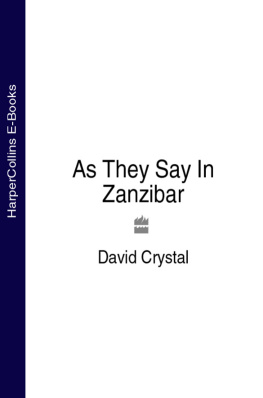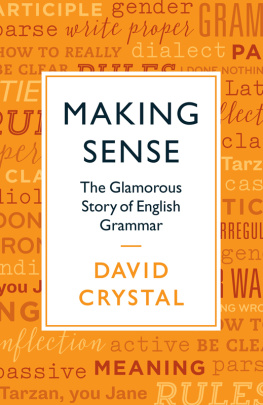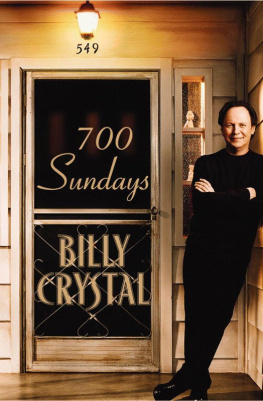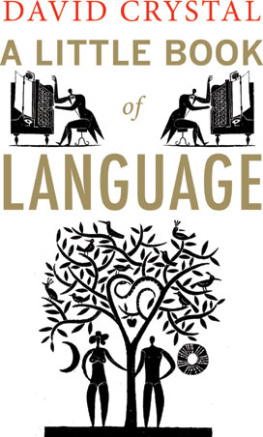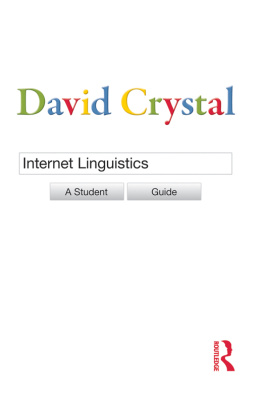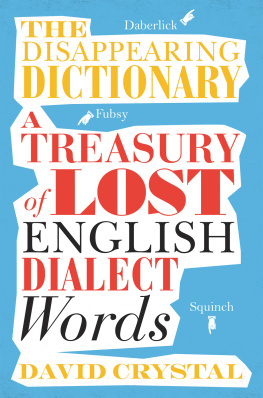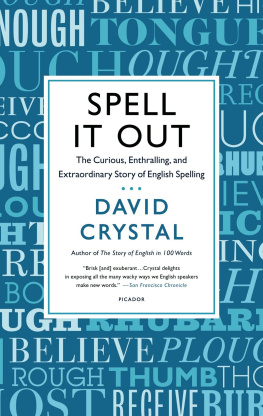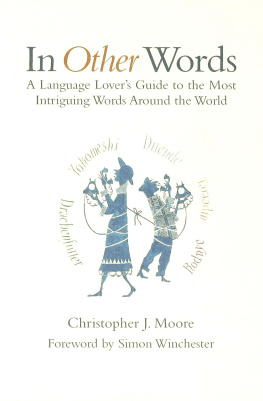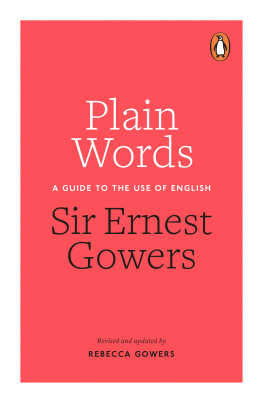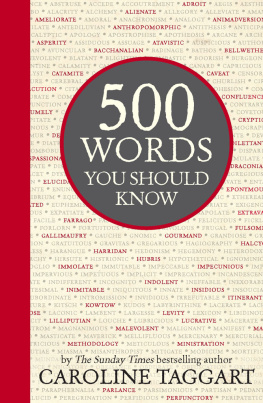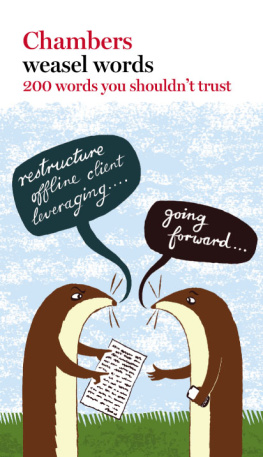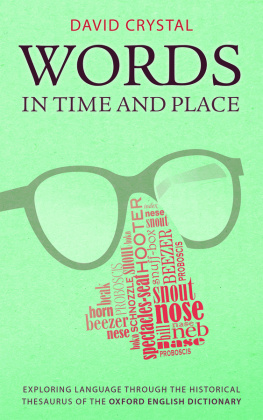The Story of English in 100 Words
Also by David Crystal
The Cambridge Encyclopedia of language
The Cambridge encyclopedia of the English language
The stories of English
The fight for English
Think on my words: an introduction to Shakespeares language
Txting: the gr8 db8
By hook or by crook: a journey in search of English
A little book of language
Evolving English: one language, many voices.
Begat: the King James Bible and the English language
Internet linguistics
Just a phrase Im going through: my life in language
The Story of English in 100 Words
David Crystal

First published in Great Britain in 2011 by
PROFILE BOOKS LTD
3A Exmouth House
Pine Street
London EC1R 0JH
www.profilebooks.com
Copyright David Crystal, 2011
10 9 8 7 6 5 4 3 2 1
Printed and bound in Great Britain by
Clays, Bungay, Suffolk
The moral right of the author has been asserted.
All rights reserved. Without limiting the rights under copyright reserved above, no part of this publication may be reproduced, stored or introduced into a retrieval system, or transmitted, in any form or by any means (electronic, mechanical, photocopying, recording or otherwise), without the prior written permission of both the copyright owner and the publisher of this book.
A CIP catalogue record for this book is available from the
British Library.
ISBN 978 1 84668 427 2
eISBN 978 184765 459 5
 | The paper this book is printed on is certified by the 1996 Forest Stewardship Council A.C. (FSC). It is ancient-forest friendly. The printer holds FSC chain of custody SGS-COC-2061 |
Contents
Preface
How can we tell the story of the English language? There seem to be two main ways. The usual approach is to provide an overview, identifying general themes and trends within the major periods of development: Old English Middle English Early Modern English Modern English. Authors give as many examples of usage within each period as space allows. Its a method Ive often used myself, in such books as The Stories of English. Its strength, to apply an old metaphor, is that readers obtain a clear view of the wood; its weakness is that they see very few of the trees.
The opposite approach can be seen in the many popular wordbooks that present a series of interesting English words and phrases. One book on my shelves explores the origins of words in personal names, such as sandwich and frisbee. Another explores the origins of interesting idioms, such as its raining cats and dogs. Ive used this method too, such as in my collection of international proverbs, As They Say in Zanzibar. Now we have the opposite strength and weakness: readers see lots of trees but do not obtain an overall picture of the wood.
The present book brings together these two perspectives. It is a wordbook, as its chapter headings illustrate, but one with a difference. Every word has been selected because it tells us something about the way the English language developed. And in the course of exploring each one, I move from the particular to the general, relating the word to important themes and trends in the language as a whole. A sense of linguistic history is reinforced by the ordering of the chapters, which is broadly chronological. And the approach has its surprises. Words such as and and what are not usually included in wordbooks, but they too have a story to tell.
It is, of course, a personal list. If you had to choose 100 words to represent the English language, they would certainly be different. These are mine.
A short history of English words
The Anglo-Saxon monk Bede, writing in his monastery in Northumbria in about the year 730, gives us an early account of those who first spoke the English language. In his Ecclesiastical History of the English Nation, written in Latin, he tells us that the island contains five nations, the English, Britons, Scots, Picts and Latins, each in its own peculiar dialect cultivating the sublime study of Divine truth. And he goes on to explain how this situation came about.
The first arrivals, Bede says, were Britons (we would now call them Celts), and they gave their name to the land. The Picts then arrived in the north, from Scythia via northern Ireland. The Scots arrived some time later, and secured their own settlements in the Pictish regions. Then, in the year of Rome 798 (= 43 AD), Emperor Claudius sent an expedition which rapidly established a Roman presence in the island.
The Romans ruled in Britain until the early 5th century, when Rome was taken by the Goths and military garrisons were withdrawn. Attacks on the Britons by the Picts and Scots followed. The Britons appealed to Rome for help, but the Romans, preoccupied with their own wars, could do little. The attacks continued, so the Britons came to a decision. As Bede recounts:
They consulted what was to be done, and where they should seek assistance to prevent or repel the cruel and frequent incursions of the northern nations; and they all agreed with their King Vortigern to call over to their aid, from the parts beyond the sea, the Saxon nation Then the nation of the Angles, or Saxons, being invited by the aforesaid king, arrived in Britain with three long ships.
The Anglo-Saxon Chronicle reports their landing in Ebbsfleet (Pegwell Bay, near Ramsgate, Kent) in 449 AD. And within 250 years, it would seem from the earliest records, the language we now know as Old English (sometimes called Anglo-Saxon) achieved its distinctive character.
English vocabulary
Vocabulary is always a primary index of a languages identity, simply because there is so much of it. Anyone who has tried to learn a foreign language knows that the pronunciation and basic grammar can be acquired relatively quickly, but the task of word-learning seems to have no end. Vocabulary is indeed the Everest of language. And it is a mountain that has to be scaled if fluency is to be attained.
In the case of English, the task has been made more complex by the range and diversity of its vocabulary a reflection of the colourful political and cultural history of the English-speaking peoples over the centuries. To change the metaphor: English is a vacuum-cleaner of a language, whose users suck in words from other languages whenever they encounter them. And because of the way English has travelled the world, courtesy of its soldiers, sailors, traders and civil servants, several hundred languages have contributed to its lexical character. Some 80 per cent of English vocabulary is not Germanic at all.
English is also a playful and innovative language, whose speakers love to use their imaginations in creating new vocabulary, and who are prepared to depart from tradition when coining words. Not all languages are like this. Some are characterised by speakers who try to stick rigidly to a single cultural tradition, resisting loanwords and trying to preserve a perceived notion of purity in their vocabulary (as with French and Icelandic). English speakers, for the most part, are quite the opposite. They delight in bending and breaking the rules when it comes to word creation. Shakespeare was one of the finest word-benders, showing everyone how to be daring in the use of words.
Next page

